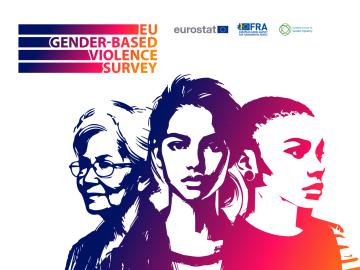The results from the EU gender-based violence survey represent women aged 18 to 74 from across the EU. The survey covers experiences of physical, sexual and psychological violence, including domestic and non-partner violence. It also reports on sexual harassment at work.
The survey findings concern issues such as:
- The prevalence of violence: 1 in 3 women in the EU have experienced physical violence, sexual violence, or threats in their adulthood.
- Sexual violence and rape: 1 in 6 women in the EU have experienced sexual violence, including rape, in their adulthood.
- Violence at home: Home is not always safe for many women: 1 in 5 women have faced physical or sexual violence from their partner, a relative, or another member of their household.
- Sexual harassment at work: 1 in 3 women have been sexually harassed at work. Younger women report a higher prevalence, with 2 in 5 having experienced sexual harassment in their workplaces.
- The non-reporting of violence: Although a majority of women who have experienced violence have spoken to a person close to them about this, only 1 in 5 have contacted a healthcare or social service provider, and just 1 in 8 have reported the incident to the police.
The EU gender-based violence survey was carried out jointly by Eurostat, FRA, and EIGE—the three organisations which are responsible respectively for official statistics, human rights, and gender equality within the EU. The data collection took place between September 2020 and March 2024. The results of the survey provide data which will better enable policymakers across the EU to combat violence against women and give more effective support to victims.
The data can be found in the Eurostat’s gender-based violence dataset (available at 11:00 CET).
Eurostat’s Statistics Explained article (available at 11:00 CET) also describes some of the survey findings.
Quote from Eurostat Director-General Mariana Kotzeva:
“Today, Eurostat, in cooperation with FRA and EIGE, has published the EU-country-level results of the EU gender-based violence survey. The statistics on the often-hidden phenomenon of gender-based violence are based on rigorous data collection methods across the EU member states, making these statistics a trusted foundation for public awareness and policy action. Eurostat thanks all those who courageously, safely, and anonymously shared their experiences with interviewers.”
Quote from FRA Director Sirpa Rautio:
“There are no safe spaces for women, free from violence and harassment. Back in 2014, with its first EU-wide survey on violence against women, FRA revealed the extent to which women experience violence every day and everywhere. A decade later, we continue to witness the same shocking levels of violence that affect 1 in 3 women. Rates of violence against women remain far too high. Policymakers, civil society and frontline workers urgently need to support and protect the rights of all victims of gender-based violence and domestic abuse no matter where it takes place.”
Quote from EIGE Director Carlien Scheele:
“When we face an alarming reality where one in three women experience violence in the EU, but just over 1 in 8 report it, it demands a serious look at the systemic issues getting in the way from shifting the dial. Today the results of our survey data release truly underscores the importance of my Agency’s work in ending gender-based violence. Violence against women is rooted in control, dominance and inequality. When a gendered perspective is integrated into prevention measures, services and authorities, then we can expect to see more women coming forward, trusting that they will receive the support they need. Because every woman has a right to be safe - everywhere.”
For more, please contact:
- Eurostat: eurostat-mediasupport@ec.europa.eu / Tel.: +352 4301 33 408
- FRA: media@fra.europa.eu / Tel.: +43 1 580 30 653
- EIGE: georgie.bradley@eige.europa.eu / Tel.: +370 6982 78 26
